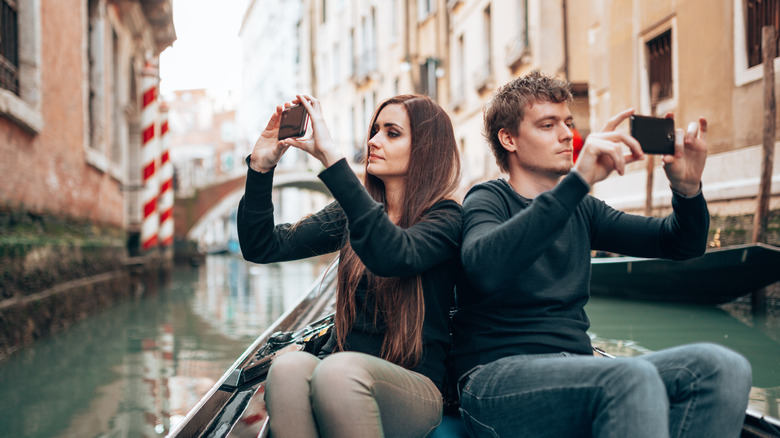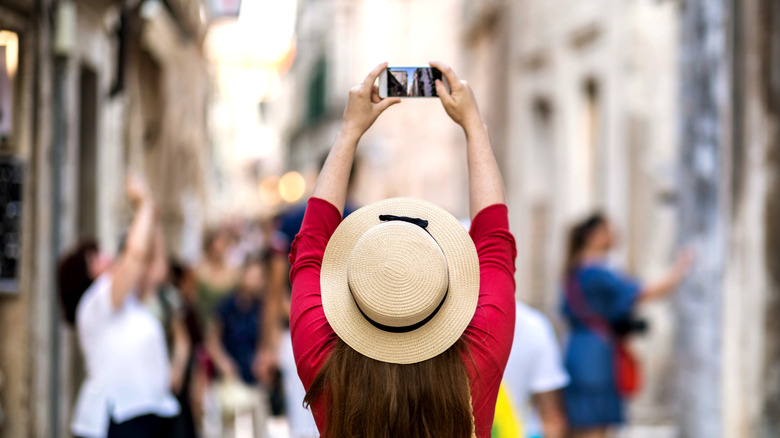Over the course of 50 years as an author and television host offering advice about travel, Rick Steves has become one of the most trusted sources of information for anyone who is planning to take a trip. His in-depth advice about how to maneuver throughout an unfamiliar destination has endeared him to travelers around the world. The years that he’s spent researching this topic has also afforded Steves the opportunity to observe how travel has changed over time, from how people choose a destination and identify which points of interest they visit on their trips, to the way they stay connected with friends and family back home. He’s come to realize that all of these activities have been shaped by the influence of social media.
The day after Steves graduated from high school in 1973, he set off with one of his friends to spend the summer exploring Europe, per Rocky Mountain PBS. After years of return trips to Europe, and a career of offering travel guidance and tips, he claims that the trip he took in 1973 is still his favorite. The sense of adventure that he and his friend shared as they embarked on their journey has remained with him to this day. Nowadays it seems that the spirit of carefree exploration has given way to becoming more of an experience that is filtered through the lens of social media trends. He highlights many of the ways that this change has taken place.
Following the crowd

As a travel expert, Steves has always prided himself on equipping his readers with the skills and the knowledge to build an itinerary that is fulfilling and memorable. “When I started traveling, there was not enough information. People needed my books,” he tells RMPBS. However, crowdsourcing travel advice has developed over the years, which Steves refers to as “a new plague.” He explains, “Now there’s too much information, and what I do is curate information as much as produce it.” Steves addresses one of the main problems with crowdsourcing travel advice when he says, “Crowds are worse now because everybody’s going to the same places because we have this Instagram mentality where we all want to do the same thing and show it off on our social media site.”
In addition to creating larger crowds, these so-called “experts” may simply offer bad advice. Steves says that there are “too many superlatives, … too many first-timers that are writing things up like they’re experts,” and “too many people that just follow them like they’re experts.” He claims this advice may only be based on what’s popular or trending, and not necessarily based on real research or experience. “It’s the whole TripAdvisor thing. People are doing wacky things because it’s number one on TripAdvisor. ‘Everybody else is doing it. It must be right, so I’m going to do it.'” He continues by cautioning that the future of AI will also affect the quality of information that people receive.
Not staying in the moment

Following crowdsourced advice affects your trip in another way as well. A destination’s most popular point of interest may not necessarily match your own personal interests. If your goal in traveling is to become immersed in a different culture, the social media high points are not necessarily where you’ll enjoy an authentic experience. “Join the locals,” Steves suggests on his website. “Hang out with Europeans in their element. Visit the weekly market and buy fruit from the farmer. Attend an evensong service in England. … Join the old retired French guys in a game of petanque.” These experiences won’t have the same crowds of tourists, and they’ll offer you a unique way to explore the local culture.
Social media has provided some benefits to travelers, of course, such as the opportunity to stay in touch with loved ones back home. Solo travelers, for example, can have peace of mind knowing that a friend or family member is aware of their itinerary, and it can be fun to share photographs of a family adventure or a long-awaited trip to Europe with your circle of friends. However, Steves cautions travelers not to let the potential for constant communication interfere with the trip. “There’s a challenge for people to be in the moment,” he explains to RMPBS. “When we were filming in Venice, it was hard to find anybody on a gondola being romantic. They were ignoring their partners and taking pictures. So that’s a sad thing,” he adds.
Breaking the spell

Portra/Getty Images
Steves points out that staying connected to the outside world may not really be your objective as you travel. “Of course, all of this assumes you want to be in touch while traveling,” he says on his website. Part of the joy and romance of travel is immersing yourself in a new experience, and the constant lure of social media can detract from it. “Consider a different approach: Truly unplug on your vacation, bury your phone in the bottom of your suitcase, forget about your email inbox, and be present in Europe.”
The constant connection to social media during a trip could be compared to a scene from the movie, “Somewhere in Time.” When Christopher Reeve pulls a modern-day penny from his pocket, the spell of his time-travel romance is broken. Traveling to a new destination can be a magical experience, and the social media interruption can break that spell. Traveling can provide you with new insight into cultures from past centuries as well as cities in the modern day. It helps you gain a sense of your own place in the world as you embrace the adventure. As Steves suggests, don’t be afraid to disconnect on your next trip. It can be relaxing — and healthy — to be off the grid for awhile. Let the magic of the experience cast its spell, and savor the moments and the memories of your journey far from home and into the unfamiliar.

